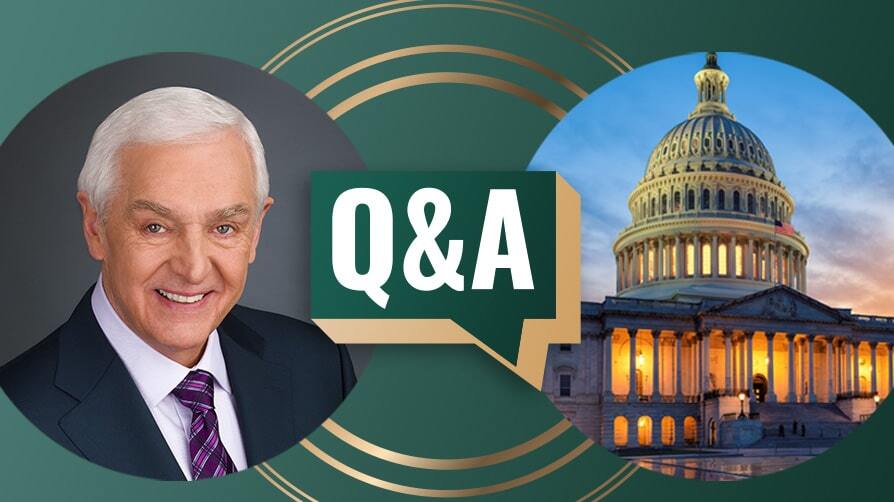From Worrier to Warrior
Advice columnist Ann Landers, when asked if there was a common denominator among the thousands of letters that came to her, said that the great overriding theme of all the letters was fear—fear of nearly everything imaginable until the problem became, for countless readers, a fear of life itself.
Yet Proverbs 3:25–26 commands, “Do not be afraid of sudden terror, nor of trouble from the wicked when it comes; for the Lord will be your confidence.” It seems two of the most terrible criminals live within our own hearts—the diabolical duo of fear and worry. They stalk us whenever we board an airplane, open a bill, visit a doctor, walk down a darkened sidewalk, or glance at the clock when our child is late for curfew.
Fear Is a Universal Problem
Christians aren’t exempt from fear. Judging from Scripture, God’s people can expect to be tormented by the same alarms as everyone else. Though the disciples had Jesus continually with them, they seemed constantly afraid—of storms, of crowds, of poverty, of armies, of loss of status, of the loss of their leader.
Worry is a particularly virulent form of fear. Someone said that worry is a trickle of fear that meanders through the mind until it cuts a channel into which all other thoughts drain.
Do I ever worry? Of course I do; I’ve raised four children to adulthood, and I’ve faced serious illness. That qualifies me as an expert on the subject. But for me, worry is a small town I pass through, not a place to hang my hat. It’s a momentary phase, not a lifestyle. For many people, worry has become so ingrained in their personalities that, once the old worries are gone, they search for new ones.
That’s why fear and worry are sins—they doubt God’s promises, question His power, disregard His presence, and divert our hearts from His praise. John Wesley said, “I would no more worry than I would curse or swear.” How, then, do we lock up the criminals of fear and worry? With three God–given weapons of our own:
God has given us weapons to overcome fear and worry.
Step One: Pray About Your Problems
First, let your fears drive you to the Lord in prayer. The “Six Words of Wisdom for Worriers” are—Worry about nothing—pray about everything! The Living Bible translates Philippians 4:6–7 this way: “Don’t worry about anything; instead, pray about everything; tell God your needs, and don’t forget to thank Him for His answers. If you do this, you will experience God’s peace, which is far more wonderful than the human mind can understand.”
Elisha Hoffman met a woman in Lebanon, Pennsylvania, whose depression seemed beyond cure. She poured out her pent–up sorrows, crying, “What shall I do? Oh, what shall I do?” Hoffman told her to take her sorrows to Jesus. “You must tell Jesus,” he said.
“Yes!” she replied, suddenly understanding. “That’s it! I must tell Jesus.” Her words echoed in Hoffman’s ears, and from that experience, he wrote the hymn, “I Must Tell Jesus” with its splendid chorus:I must tell Jesus! I must tell Jesus!
I cannot bear my burdens alone;
I must tell Jesus! I must tell Jesus!
Jesus can help me, Jesus alone.
Prayer is our primary method for telling Jesus about our worries and, in the process, of recognizing the presence of God. We draw near to Him in prayer, and in His presence is peace. Admittedly, this may take some time. It often takes a season of abiding before the Lord before our hearts break through into the fullness of His peace.
Jesus prayed three times about His burden in Gethsemane. Paul asked three times for relief from his thorn in the flesh. Elijah prayed seven times for rain to fall on Carmel (Matthew 26:44; 2 Corinthians 12:8; 1 Kings 18:43).
Fear is a spiritual yardstick, and we grow stronger as we learn to cast our cares on Him in prayer.
Sometimes peace comes instantly; other times, it comes slowly but surely as we linger before God’s throne. In either case, our fear level is a sort of referendum on the closeness of our friendship with God. It’s a spiritual yardstick, and we grow stronger as we learn to cast our cares on Him in prayer.
Step Two: Pour Over God’s Promises
Having given our fears to God in prayer, we must pour over the Scriptures, searching out specific promises for our needs. Copy them down, memorize them, and meditate on them when rising in the morning, going to bed at night, and working throughout the day. Here are some verses that have helped me:
Psalm 27:1: “The Lord is my light and my salvation; whom shall I fear? The Lord is the strength of my life; of whom shall I be afraid?”
Psalm 118:6: “The Lord is on my side; I will not fear. What can man do to me?”
Proverbs 29:25: “The fear of man brings a snare, but whoever trusts in the Lord shall be safe.”
Psalm 37:8: “Do not fret—it only causes harm.”
Isaiah 41:10: “Fear not, for I am with you; be not dismayed, for I am your God. I will strengthen you, yes, I will help you, I will uphold you with My righteous right hand.”
Those verses are the best fear insurance you can find. Clip them out and place them in locations where you’re prone to anxiety attacks. Hide them in your heart, and let the Word of God fortify your spirit.
Step Three: Persevere With Passion and Peace
Then, trust Him.
The author of Hebrews wrote to those facing persecution in the first century. In chapter 12, we find that since believers in earlier generations trusted God with their difficulties, we too should “run with perseverance the race marked out for us, fixing our eyes on Jesus, the pioneer and perfecter of faith” (verses 1–2 NIV). Perseverance means we aren’t going to be terrorized by worry and fear. We’re going to trust God, fix our eyes on Christ, and keep going.
Missionary E. Stanley Jones learned this in India. He arrived on the mission field with a great passion for ministry but battling crippling anxiety that led to periodic physical collapses. Diagnosing himself, Jones admitted to “brain fatigue, nervous exhaustion, and depression.” In this state, Jones traveled to the city of Lucknow for a series of meetings. There, one night while praying, he felt the Lord speaking to him. Though not audible, the Lord’s voice seemed to say:
Perseverance means we aren’t going to be terrorized by worry and fear.
Are you yourself ready for this work to which I have called you?
“No, Lord, I am done for,” Jones replied. “I have reached the end of my resources.”
If you will turn that over to Me and not worry about it, I will take care of it.
“Lord,” Jones said, “I close the bargain right here.”
Just then, a great peace pervaded his whole being. “I knew it was done! Life—Abundant Life—had taken possession of me. I was so lifted up that I scarcely touched the road as I quietly walked home that night. I went through the days, working far into the night, and came down to bedtime wondering why in the world I should ever go to bed at all, for there was not the slightest trace of tiredness of any kind. I seemed possessed by life and peace and rest—by Christ Himself.”
For the rest of his life, Jones never forgot what the Lord had whispered in his ear: If you will turn that over to me and not worry about it, I’ll take care of it.
Are the cruel criminals of fear and worry stalking you? Let your fears drive you to prayer, claim God’s promises, and persevere by fixing your eyes on Jesus. If you’ll turn your burden over to Him and not worry about it, He’ll take care of you. The Lord Jesus Himself said: “These things I have spoken to you, that in Me you may have peace. In the world you will have tribulation; but be of good cheer, I have overcome the world” (John 16:33).
This article was adapted from Dr. David Jeremiah’s book Slaying the Giants in Your Life.
Featured
Most Popular
I need help

Your response has been received, and we will be praying for you.
Look for answers to some of the most common questions in the weeks ahead.










